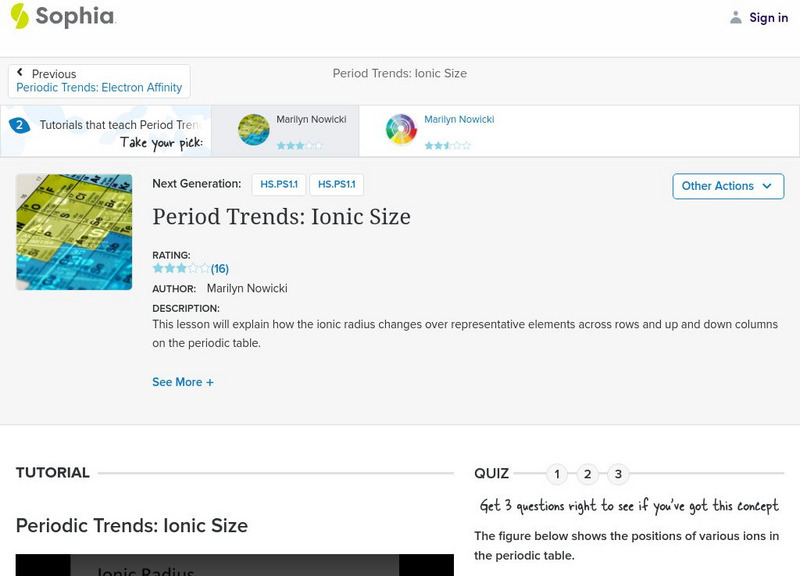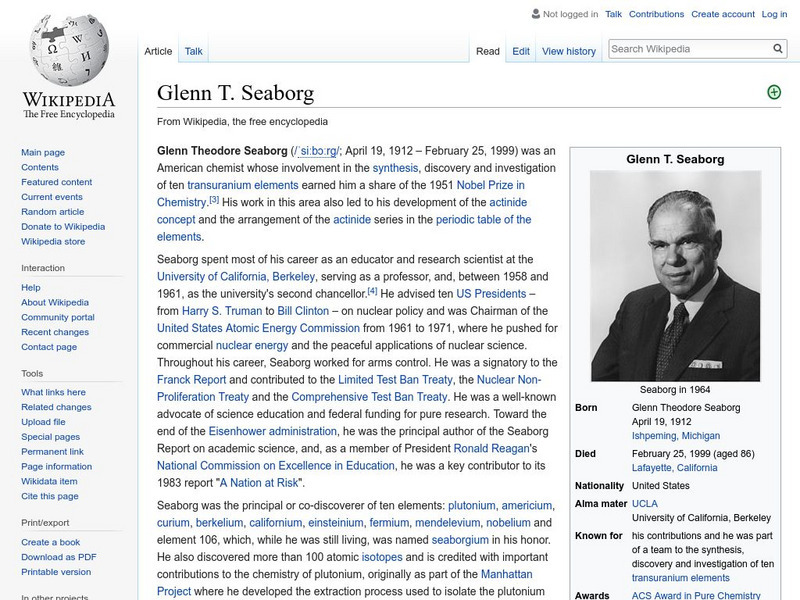Hi, what do you want to do?
State University of New York
State University of New York: Electron Configuration of Ions
The following simulation displays electron configurations for elements in relation in relation to the element's position on the periodic table.
Simon Fraser University
Chem1 Virtual Textbook: Electronegativity
Acting as a subtopic of the General Chemistry Virtual Textbook's section on Atoms and the Periodic Table, this site discusses shared chemical bonds between two elements resulting in electronegative and electropositive outcomes.
Sophia Learning
Sophia: Atomic Mass: Lesson 1
This lesson explains what is represented by the atomic mass, and how it varies from one element to the next. It is 1 of 4 in the series titled "Atomic Mass."
Texas Instruments
Texas Instruments: Intro to Chemistry
This StudyCards stack enables students to review the vocabulary terms encountered in an introductory chemistry class.
Sophia Learning
Sophia: Valence Electrons
During this exercise, practice finding the number of valence electrons in an element. [1:22]
Sophia Learning
Sophia: Period Trends: Ionic Size: Lesson 1
This lesson will explain how the ionic radius changes over representative elements across rows and up and down columns on the periodic table. It is 1 of 3 in the series titled "Period Trends: Ionic Size."
Curated OER
Core Charge of an Atom
Acting as a subtopic of the General Chemistry Virtual Textbook's section on Atoms and the Periodic Table, this site discusses the properties of the atoms individually in relation to the main group elements of the Periodic Table.
Curated OER
Atomic Radii Definitions
Acting as a subtopic of the General Chemistry Virtual Textbook's section on Atoms and the Periodic Table, this site discusses the properties of the atoms individually in relation to the main group elements of the Periodic Table.
Curated OER
Ionic Radii Measurement
Acting as a subtopic of the General Chemistry Virtual Textbook's section on Atoms and the Periodic Table, this site discusses the properties of the atoms individually in relation to the main group elements of the Periodic Table.
Curated OER
Covalent Atomic Radii Periiodic Trends
Acting as a subtopic of the General Chemistry Virtual Textbook's section on Atoms and the Periodic Table, this site discusses the properties of the atoms individually in relation to the main group elements of the Periodic Table.
Curated OER
Ionic Radii Periiodic Trends
Acting as a subtopic of the General Chemistry Virtual Textbook's section on Atoms and the Periodic Table, this site discusses the properties of the atoms individually in relation to the main group elements of the Periodic Table.
Curated OER
Isoelectronic Series
Acting as a subtopic of the General Chemistry Virtual Textbook's section on Atoms and the Periodic Table, this site discusses the properties of the atoms individually in relation to the main group elements of the Periodic Table.
Curated OER
Ionization Energies Periiodic Trends
Acting as a subtopic of the General Chemistry Virtual Textbook's section on Atoms and the Periodic Table, this site discusses the properties of the atoms individually in relation to the main group elements of the Periodic Table.
Curated OER
Electron Affinities Periiodic Trends
Acting as a subtopic of the General Chemistry Virtual Textbook's section on Atoms and the Periodic Table, this site discusses the properties of the atoms individually in relation to the main group elements of the Periodic Table.
Wikimedia
Wikipedia: Glenn T. Seaborg
An Wikipedia article on Glenn Seaborg discusses his accomplishments in the world of chemistry. It discusses his creation of the element Plutonium and his work with the Manhattan Project. Also provides some information on personal life...
Wikimedia
Wikipedia: Dmitri Mendeleev
This biography on scientist Dmitri Mendeleev details his childhood, gives information on his scientific studies, and discusses his formal presentation made to the Russian Chemical Society in which he detailed his findings on elements.
Royal Society of Chemistry
Chemical Society: Krypton
A short description of krypton and how it plays a role in the definition on the meter provided for by Chemical Society.
Wikimedia
Wikipedia: Henry Moseley
This site from the Wikipedia Encyclopedia provides an overview of the life of scientist Henry Moseley. This open-source encyclopedia site discusses his contribution to science and how he found a systematic relation between wavelength and...















